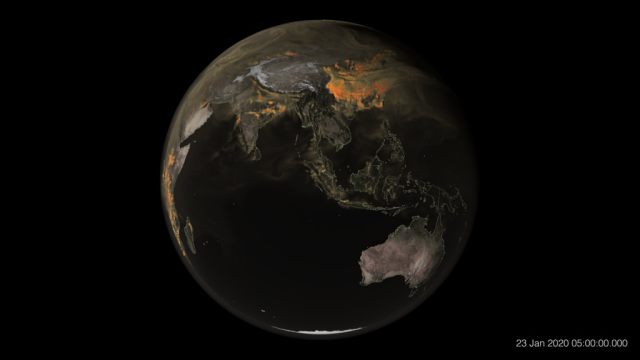Watch Carbon Dioxide Move Through Earth’s Atmosphere – NASA Science


Sustainable Development Goals and Emissions Distribution

Emissions Distribution
- Over China, the United States, and South Asia, the majority of emissions came from power plants, industrial facilities, and cars and trucks.
- In Africa and South America, emissions largely stemmed from fires, especially those related to land management, controlled agricultural burns, deforestation, and the burning of oil and coal.
Fires release carbon dioxide as they burn.
SDGs, Targets, and Indicators
1. Which SDGs are addressed or connected to the issues highlighted in the article?
- SDG 7: Affordable and Clean Energy
- SDG 9: Industry, Innovation, and Infrastructure
- SDG 11: Sustainable Cities and Communities
- SDG 13: Climate Action
- SDG 15: Life on Land
2. What specific targets under those SDGs can be identified based on the article’s content?
- SDG 7.2: Increase the share of renewable energy in the global energy mix
- SDG 9.4: Upgrade infrastructure and retrofit industries to make them sustainable
- SDG 11.6: Reduce the adverse per capita environmental impact of cities
- SDG 13.2: Integrate climate change measures into national policies, strategies, and planning
- SDG 15.2: Promote the implementation of sustainable management of all types of forests
3. Are there any indicators mentioned or implied in the article that can be used to measure progress towards the identified targets?
While the article does not explicitly mention specific indicators, it provides information that can be used to measure progress towards the identified targets. For example, the article mentions that emissions in China, the United States, and South Asia come from power plants, industrial facilities, and cars and trucks. The indicator for SDG 7.2 could be the percentage increase in the share of renewable energy in these regions’ energy mix. Similarly, the article mentions emissions from fires, land management, controlled agricultural burns, and deforestation in Africa and South America. The indicator for SDG 15.2 could be the extent of sustainable forest management practices implemented in these regions.
4. SDGs, Targets, and Indicators
| SDGs | Targets | Indicators |
|---|---|---|
| SDG 7: Affordable and Clean Energy | 7.2: Increase the share of renewable energy in the global energy mix | Percentage increase in the share of renewable energy in emissions from power plants, industrial facilities, and transportation in China, the United States, and South Asia |
| SDG 9: Industry, Innovation, and Infrastructure | 9.4: Upgrade infrastructure and retrofit industries to make them sustainable | Extent of infrastructure upgrades and retrofits in power plants, industrial facilities, and transportation in China, the United States, and South Asia |
| SDG 11: Sustainable Cities and Communities | 11.6: Reduce the adverse per capita environmental impact of cities | Reduction in emissions per capita from power plants, industrial facilities, and transportation in China, the United States, and South Asia |
| SDG 13: Climate Action | 13.2: Integrate climate change measures into national policies, strategies, and planning | Inclusion of climate change measures in national policies, strategies, and planning in China, the United States, and South Asia |
| SDG 15: Life on Land | 15.2: Promote the implementation of sustainable management of all types of forests | Extent of sustainable forest management practices implemented in Africa and South America |
Source: science.nasa.gov








